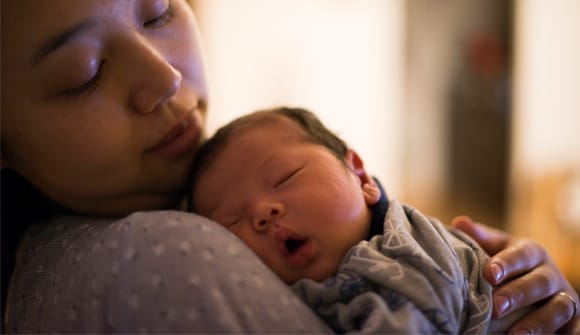Hush little baby
Help your newborn fall asleep with these pediatrician-recommended tips.
Article Author: Katie McPherson
Article Date:

New parents may be surprised just how much their babies sleep. In fact, newborns average about 17 hours of snoozing per day. That’s because sleep promotes all the important growth and development little ones go through during this critical stage.
“If children are getting an adequate amount of sleep, they’re healthier and they grow better,” said Randolph "Randy" Thornton, MD, a pediatrician at Jacksonville Pediatrics and Wolfson Children’s Hospital.
Better sleep for baby
Unfortunately, as babies grow and become more alert in their first few months, they’ll need a little more assistance in the drifting off department. To help your baby learn how to fall asleep, start a regular, comforting routine before putting him or her to bed. This may include a bath, bedtime story, and breastfeeding or bottle-feeding session before laying your little one down.
“There are certain things you can try to help them get more sleep, but remember that all babies grow at different rates and feed differently,” said Dr. Thornton. He recommends:
- Having a white noise machine, which has been proven to help babies sleep.
- Making baby's nap space dark using blackout curtains or blinds.
- Keeping the room a comfortable temperature.
The importance of safe sleep
When putting babies down for a nap or for the night, always follow safe sleep habits, including placing them on their back to sleep, removing any loose blankets or pillows from the crib, and ensuring the mattress is firm and fits snugly against the crib’s sides. Knowing your baby is catching Z’s safely will help you rest easy, too.
“The most important thing is following safe sleep practices to reduce the risk of sudden infant death syndrome (SIDS). Never compromise safety by letting babies under 1 sleep on their belly or bringing them into your bed,” said Dr. Thornton.
Sleep through the ages
By around 4 months old, babies will usually be sleeping longer during the night, with three to four naps during the day (though teething or growth spurts can still cause sleepless nights for parents here and there). At 1 to 2 years of age, your little one will log between 11 and 14 hours of sleep each night, plus a nap or two throughout the day. So, hold tight, sleep-deprived parents. More Z’s are coming soon.
Looking for a pediatrician for your baby who can provide expert advice and quality care? Click here to fill out an appointment request form.



